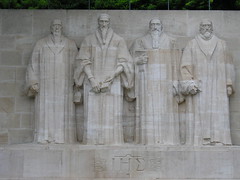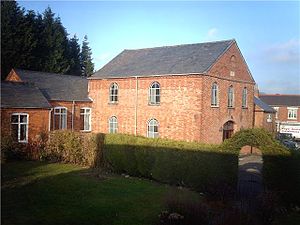There’s an excellent article by Scott Clark over at The Heidelblog called ‘Always Abusing Semper Reformanda’. I didn’t realise the phrase Reformed, Always Reforming had such a recent history. To have the phrase quoted back at you kind of felt all wrong. To know what you mean, and have it twisted or mangled to mean something antithetical seemed like an own goal. But here’s for me maybe the main paragraph in the article:
“When Calvin and the other Reformed writers used the adjective reformed, they did not think that it was a thing that could never actually be accomplished. Late in his life, Calvin remarked to the other pastors in Geneva that things were fairly well constituted, and he exhorted them not to ruin them. He and the others thought and spoke of reformation of the church not as a goal never to be achieved in this life, but as something that either had been or could be achieved because they believed God’s Word to be sufficiently clear. That is, what must be known for the life of the church can be known and, with the help of God’s Spirit and by God’s grace alone, changes could be made (and were being made) to bring the doctrine, piety, and practice of the church into conformity with God’s will revealed in Scripture. That’s why they wrote church orders and adopted confessions—because they believed that reformation was a great but finite task.”
Note the phrase(s) in bold – that’s my emphasis BTW not Dr Clarke’s, though it’s certainly what he is saying. Like the article indicates it’s a common thing to have the phrase ‘Always Reforming’ thrown in your face. In my own experience the ‘Always’ aspect of ‘Reforming’ is to do with modern forms of worship.
This brings us to the whole modernising enterprise. I should state that I absolutely love music – all kinds of music. I say because the assumption is that if there’s a problem with modern music in the church there’s a problem with music. This isn’t the case even though a false correlation is often assumed.
Hopefully, having cleared that up, there are styles of music that do not sit well with worshipping a Holy Sovereign God. I should also say I know a number of churches that employ a modern style of worship (choruses & upbeat songs – often but not always complicated to sing) and the Ministers of these churches are good men. However, my concern is for when these good men either move on to anther Pastorate, retire or die. The point should not be lost, made in Dr Clarke’s article, that Calvin was concerned that the gains made by the Reformation should not be ruined (see highlight above). That principle applies to our own day.
The Bible (and history) powerfully illustrates man’s propensity for DE-formation. Something I try to do is take a long-term view of what is happening now. Where will this take the Church in 10, 15, 20 or 30 years from now. One thing we know about De-formation is that it can happen quickly! Not only can it happen quickly but the long-term consequences can take generations before Reformation can take place. Clearly God is able to bring both about, De-formation as a judgement, or Reformation as a blessing. So I do not discount divine intervention – without it we are sunk. Even behind a (sometimes necessary) frowning providence…
Ye fearful saints, fresh courage take;
The clouds ye so much dread
Are big with mercy and shall break
In blessings on your head.
Judge not the Lord by feeble sense,
But trust Him for His grace;
Behind a frowning providence
He hides a smiling face.
William Cowper (1731 – 1800)
The Church is always trying to innovate, often out of good motives. Behind this desire to innovate in ‘Reformed’ or Evangelical churches then, is the phrase Reformed, Always Reforming. One important question then, that deserves a longer answer perhaps in another post, is has God spoken clearly on the matter of worship or is it open to our innovations under the guise of ‘Always Reforming’.
So rather than play Cultural Catchup, let’s be content with forms of worship that do not make my foot tap or my body sway in some sort of hypnotic manner. The Church will never be Culturally Relevant. The Culture moves too fast and the Church finds itself just looking stupid. We have something the Culture does not want, but desperately needs – The Gospel of God’s Salvation. Let’s not bury it under a mish mash of outdated so-called cultural relevance. The Gospel of the Grace of God is Always relevant.



